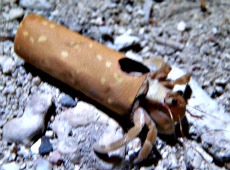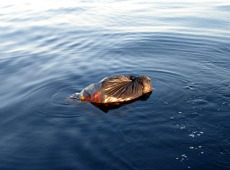Divisions have arisen between different ministerial bodies and the private sector over who should take the majority of blame for garbage being dumped into the sea.
While the Environment Ministry this month raised fears about increased levels of garbage in the sea as a result of resort waste not being properly disposed of, the Tourism Ministry responded that the more likely culprits were boat operators.
Meanwhile, the country’s safari boat industry has rejected allegations that a large number of liveaboard operators were responsible for dumping trash into the country’s waters, claiming the main problem lay with boats hired by resorts to transport waste to landfill.
Mounting complaints
Minister of Environment and Energy Dr Mariyam Shakeela told local media earlier this month that the majority of waste being produced by resorts was not reaching land set aside for disposal on the island of Thilafushi. She claimed it was instead being dumped in the sea.
Dr Shakeela stated that complaints about resorts dumping their trash were mounting and that “close inspection of waste accumulating in the sea near the capital Male’ has proved that it had been dumped by resorts”.
“The reason I say this is because most of the photos sent in by EPA [Environmental Protection Agency] and other such authorities show large quantities of orange peel. Bits of apples and tomatoes amount to most of the waste. Where does it come from? It comes from the resorts,” Shakeela said.
She added the amount of waste produced by resorts amounted to 7.5 kg per head.
Environmental authorities have nonetheless pledged to “try to establish a focal point on each resort” and conduct a waste study.
Responding to Dr Shakeela’s comments, Tourism Minister Ahmed Adheeb told Minivan News this month that resorts had their own waste management facilities, adding that dhonis (boats) were more likely to be behind dumping the garbage. He mantained that the matter was presently under investigation.
Addressing concerns about the levels of trash found in the sea, Adheeb also highlighted the lack of a nationwide waste management system.
He said that while the previous government of former President Mohamed Nasheed had proposed generating energy from incinerators – referring to ongoing uncertainty over a previous waste management project – it first needed to have incinerators in place and working.
The Ministry of Tourism, Arts and Culture has previously pledged to take the “lead” in addressing waste management issues in Male’ should the city’s council and the Ministry of Environment and Energy fail to effectively deal with concerns about garbage.
In early January, Adheeb said the issue of waste management posed an immense threat to tourism in the country. He added at the time that his department would “take the lead” to actively address the problem should other authorities fail to resolve ongoing concerns by February 2013.
However, opinion about levels of trash being dumped in the sea appears further divided among boat operators in the country – particularly within the safari boat industry, which provides trips and cruises for both tourists and Maldivians.
Safari boat waste dumping
A source with over 16 years experience in the safari boat industry has alleged that approximately 75 percent of safari (liveaboard) boats were responsible for prolific waste dumping.
 “Every night when all the guests go to sleep around 12:00am to 1:00am, the liveaboard staff throws everything into the sea. This includes basically everything, all the trashcans [bags], plastic bottles, foods, lube oil, for example,” the source said.
“Every night when all the guests go to sleep around 12:00am to 1:00am, the liveaboard staff throws everything into the sea. This includes basically everything, all the trashcans [bags], plastic bottles, foods, lube oil, for example,” the source said.
The source further explained that the practice of dumping waste depended often on the company operating the boat, their hiring practices, and staff regulations. He alleged that the worst practices were often committed “by the ones in charge of the Liveaboard Association”.
“When you have a proper establishment they won’t let staff do that. Very good local and foreign companies strictly forbid staff to throw even cigarette butts into the ocean,” the source said.
“However, there are no regulations or requirements to work on a liveaboard and it’s all about [securing] cheap labour. This is a very big issue in the dive industry. They do not go for the qualified people,” he added.
The source claimed that with the number of foreign workers on liveaboards increasing, their work status was often illegal – making them unaware and sometimes careless regarding issues concerning waste dumping.
“It’s all about awareness and getting the right people to do the right job. At least to keep a responsible person on each liveaboard to make sure no one is illegally dumping garbage,” the source declared.
He further explained that dumping waste into the ocean was very harmful to the local ecosystem.
“The big, huge, messy black garbage bags can drift with the current and then trap healthy table coral. Harm also comes to mantas and whale sharks which stay near the surface, while sea turtles ingest plastic bags mistaking them for jellyfish,” the source said.
“If things continue like this we won’t have any healthy reefs in the next 10 to 15 years. The Maldives won’t be the same,” he claimed.
The source believed that the government in recent years – both the current and former administrations – has not taken any proper actions to try to combat the problem.
“The tourism ministry doesn’t do anything aside from talking. Actions speak louder than words and there has been no enforcement of the laws.”
In regard to the allegations of safari boats dumping waste, Tourism Minister Adheeb told Minivan News that a proper place was needed for the liveaboards to moor so the vessels can be monitored.
Liveaboard Association response
Meanwhile, the Liveaboard Association of Maldives (LAM) Secretary General Ismail Hameed told Minivan News that the allegations of safari boat waste dumping applied only to a limited number of operators. Hameed claimed that some companies would always try to flout the rules.
“Many liveaboards are following regulations [and not dumping waste into the sea], but there will be some vessels that do,” he said.
Hameed alleged that dhonis carrying resort waste are responsible for illegal waste dumping.
“Resorts send their garbage to Thilafushi on dhonis. The dhonis cut the trip short and dump the waste in the ocean. I’ve seen boxes labeled with resort names,” explained Hameed.
“Not all resorts are guilty of improperly dumping waste, just as not all liveaboards are guilty either,” he added.
Hameed additionally complained that the liveaboard industry has been neglected for 40 years “under every government administration”, further complicating efforts to monitor operators.
“Our main concern is there are no proper mooring and harbour system for liveaboards. There needs to be a local marina patrolled to ensure safety, proper garbage disposal, and refueling for these vessels,” he said.
“There has not been a proper mechanism for waste management implemented by the [national] government or island societies.”
Hameed claimed that the LAM has been communicating these issues to the government for “a couple of years”, explaining that the cabinet had recently approved work on a harbour for safari vessels in the Male’ area.
LAM aims to “find solutions to difficulties, issues and other things involved in liveaboard operations, including environmental issues and staff development”,
Likes (2)Dislikes
(2)Dislikes (1)
(1) 

 with Minivan News earlier this year about how minors were identified and viewed in the eyes of Maldivian law.
with Minivan News earlier this year about how minors were identified and viewed in the eyes of Maldivian law.